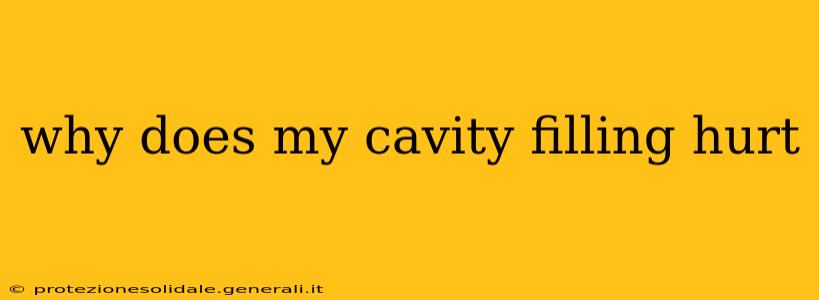A newly placed cavity filling shouldn't cause prolonged or severe pain. While some minor sensitivity is common in the days following the procedure, persistent or intense pain warrants a call to your dentist. Let's explore the reasons why your filling might be hurting and what you can do about it.
What Causes Post-Filling Pain or Sensitivity?
Several factors can contribute to discomfort after a filling:
-
Inflammation: The filling process involves removing decayed tooth structure and potentially irritating the underlying dentin and pulp (the inner part of the tooth). This irritation can cause inflammation, leading to sensitivity to temperature changes (hot and cold) and pressure. This is the most common reason for post-filling sensitivity.
-
High Filling: If the filling material is placed too high, it can create an uneven bite, resulting in pain when chewing or biting down. This pressure on the already sensitive area can exacerbate discomfort.
-
Irritation of the Gum Tissue: The process of placing a filling can sometimes irritate the surrounding gum tissue. This irritation can lead to localized pain and tenderness.
-
Infection: Although less common, a lingering infection under the filling can cause persistent pain. This is more likely if the decay wasn't completely removed before the filling was placed.
-
Fractured Tooth: In some cases, the tooth itself might be weakened or fractured during the procedure, leading to pain that is not directly related to the filling itself.
-
Sinus Infection: Pain in the upper back teeth can sometimes be referred pain from a sinus infection. This isn't directly caused by the filling but can overlap in symptoms.
How Long Should Post-Filling Pain Last?
Minor sensitivity, like increased sensitivity to hot or cold, typically subsides within a few days to a week. If the pain is sharp, severe, or lasts longer than a week, it's crucial to contact your dentist immediately. This could indicate a more serious issue.
What Should I Do If My Filling Hurts?
Immediate Actions:
- Over-the-counter pain relievers: Ibuprofen or acetaminophen can help manage mild pain and inflammation.
- Gentle rinsing: Rinse your mouth gently with salt water to help keep the area clean and reduce inflammation. Avoid vigorous rinsing or brushing near the filling site.
- Avoid hot and cold foods and drinks: This helps minimize sensitivity until the inflammation subsides.
- Soft foods: Stick to softer foods that require less chewing to avoid putting pressure on the filling.
When to See Your Dentist:
Contact your dentist immediately if you experience:
- Severe pain: Pain that doesn't respond to over-the-counter medication.
- Persistent pain: Pain that lasts longer than a week.
- Swelling: Swelling in the gums or around the affected tooth.
- Fever: A fever accompanied by tooth pain.
- Increased sensitivity: Sensitivity that worsens over time.
Could There Be Other Issues besides the Filling?
Yes. As mentioned, referred pain from a sinus infection can mimic tooth pain. Other dental problems, such as an abscessed tooth or a cracked tooth, could also be present. Your dentist will be able to determine the root cause through a thorough examination.
Can a filling cause lasting damage?
Properly placed fillings generally don't cause lasting damage. However, if a filling is improperly placed or if underlying decay wasn't adequately addressed, it could lead to further problems. Regular dental checkups are essential to prevent and detect such issues early on.
This information is for general knowledge and doesn't substitute professional dental advice. Always consult your dentist for any concerns regarding your dental health.
